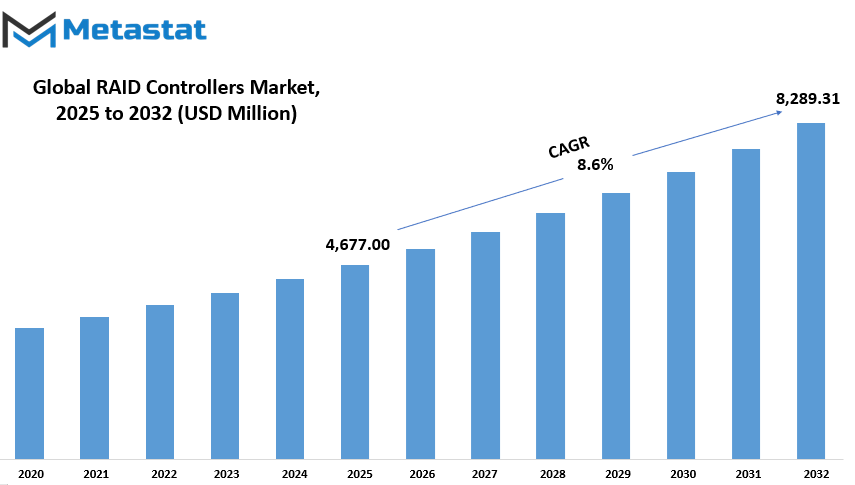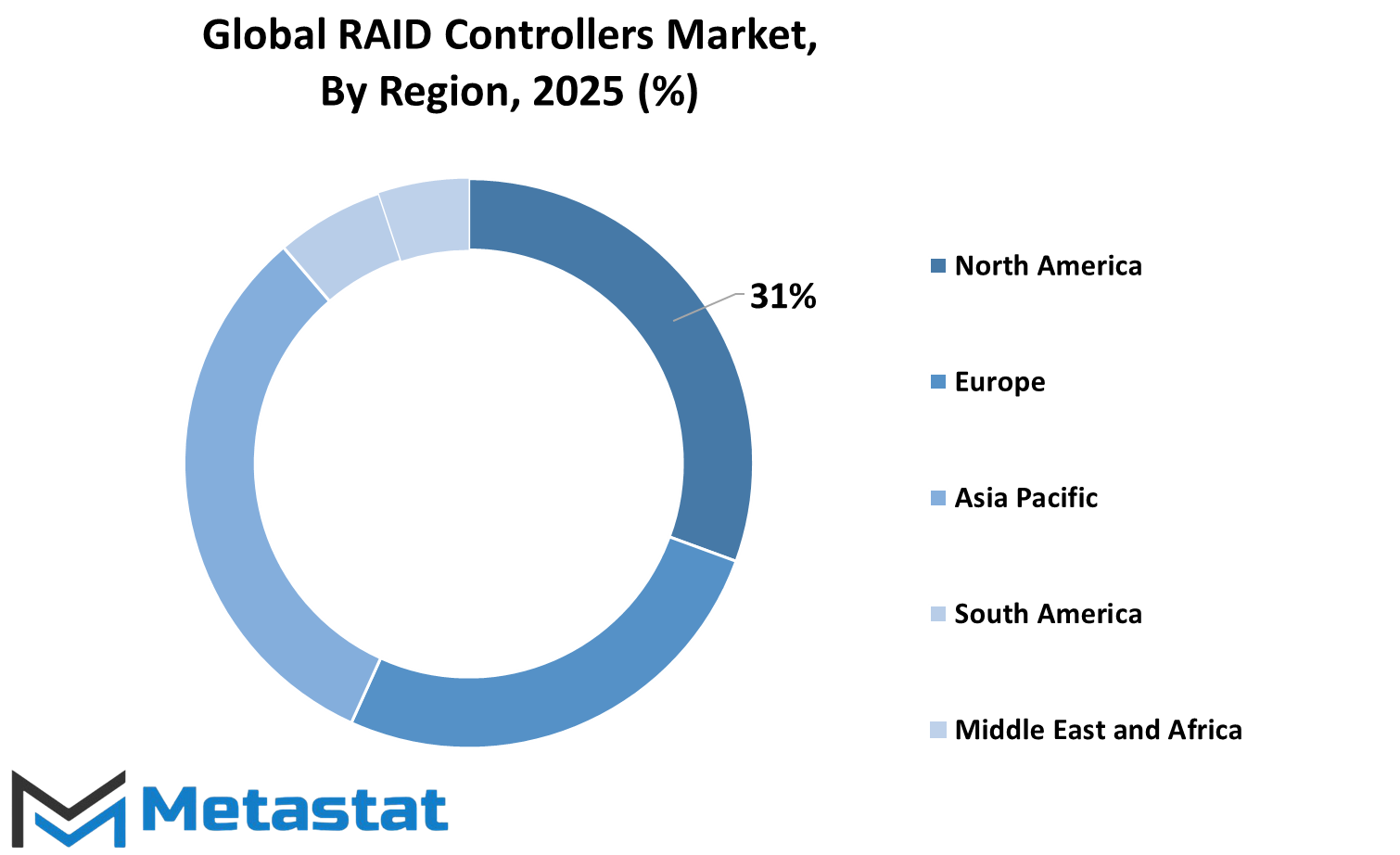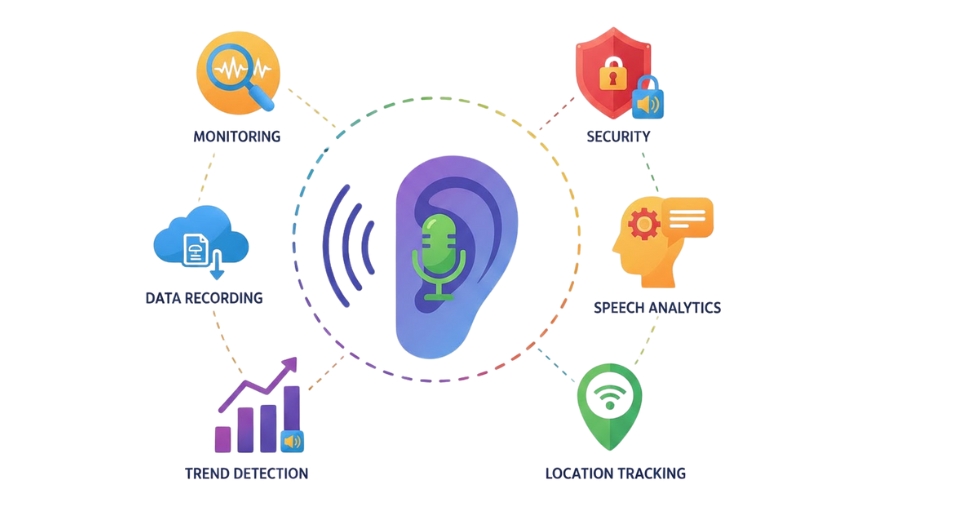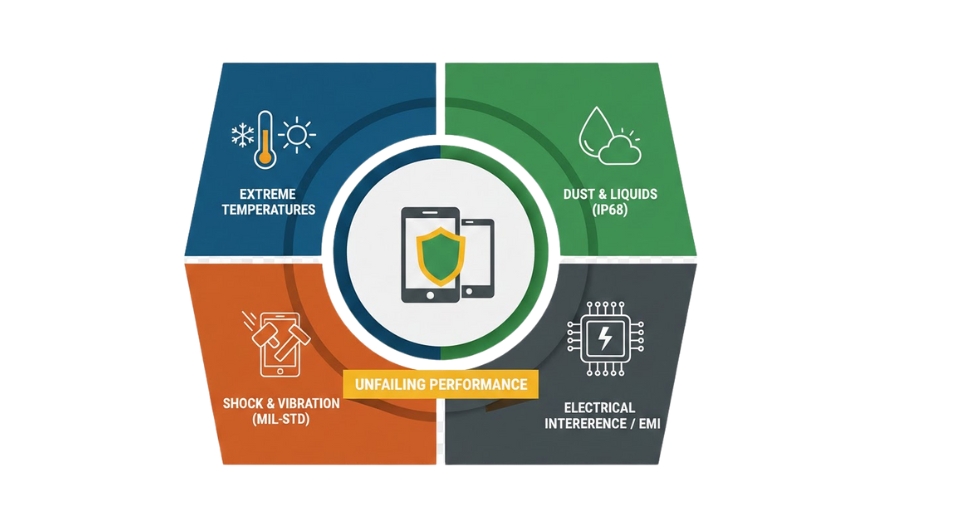MARKET OVERVIEW
The Global RAID Controllers market would, in fact undergo a critical change, triggered by technological and constantly growing demand in terms of the necessity for the proper storage solutions of data. For the foreseeable future, huge companies as well as smaller ones, businesses would widely make use of RAID (Redundant Array of Independent Disks) controllers, ensuring secure, efficient and more scalable storage of data. With the increasing amount of data produced by industries around the world, the requirement for high-capacity storage will increase as the need to manage, protect, and optimize it grows.
Another key feature will be the increasing reliance on automation. Artificial intelligence and machine learning algorithms will be integrated into RAID controllers, making them more intelligent and efficient, and thus facilitate greater levels of automation in managing the storage arrays. RAID controllers in the near future will be fully integrated with advanced analytics tools that will provide real-time information on storage performance, data integrity, and overall system health. Such will be very important towards satisfying business needs that seek high-speed access to large datasets while ensuring redundancy and protection on data.
At the same time, there will be increased focus on the Global RAID Controllers market on user experience and access. RAID controllers will be developed to be user-friendly, having intuitive interfaces, and cloud-based management platforms through which businesses will be able to monitor and control their storage systems from anywhere in the world. This remote accessibility will not only make data management more convenient but will also drive the adoption of RAID controllers in various sectors, including healthcare, finance, and retail, where data integrity and security are of paramount importance.
As more enterprises move towards hybrid and multi-cloud environments, the Global RAID Controllers market will see the development of advanced solutions that seamlessly integrate on-premise storage with cloud-based platforms. These solutions will optimize businesses' storage resources, so that data is readily available and secure, no matter where it's stored. This shift to hybrid and multi-cloud infrastructure will emphasize the need for RAID controllers capable of managing diverse storage configurations as well as offering robust backup solutions in the event of potential cloud service outages.
In terms of hardware and software innovation, the market will be dominated by the continued development of high-performance RAID controllers capable of handling the increasing data throughput demands. The next generation of RAID controllers will be built to support faster storage mediums. These will include NVMe (Non-Volatile Memory Express), as well as 3D NAND flash memory. This is because organizations will be able to obtain faster read and write speeds, lower latency, and reduced power consumption. To this end, innovations in RAID controllers will highly position them as indispensable for data centers as well as enterprises heavily dependent on mission-critical applications.
Increasing importance of security features for RAID controllers is the another market shift that will be seen. Data breaches and cyber threats in their various forms will keep becoming more sophisticated. The Global RAID Controllers market will respond to this by including more intense encryption protocols into their RAID controllers, secure boot features, as well as advanced monitoring tools to detect and prevent malicious activities. With such enhanced security features, organizations will have the capability to sustain data integrity and confidentiality across all storage environments.
Global RAID Controllers market trends look forward into advanced technology at very rapid stages and increasing need for more efficient solutions in storing large amounts of data, also to increase their safety and access, and also security. There will be ever-growing business in large data and would require this important tool that a company needs as the most valuable strategy in maintaining a large quantity of data - thus, there's RAID.
Global RAID Controllers market is estimated to reach $8,289.31 Million by 2032; growing at a CAGR of 8.6% from 2025 to 2032.

GROWTH FACTORS
The global RAID controllers market is growing at a rapid pace, driven by several factors that cater to the increasing need for efficient data storage and management solutions. The primary driver of this market is the continuous advancements in data storage technologies and redundancy systems. These innovations enable businesses to handle larger volumes of data while ensuring data security and fault tolerance. It requires RAID (Redundant Array of Independent Disks) controllers to perform its operations, thus providing solutions to guard data by ensuring that storage systems are reliable with reduced chances of data loss.
In addition to this technology advancement, the increasing data safety and backup needs have further sped up the growth of the RAID controllers market. The more data any business accumulates, the more it needs potent systems that can prevent data loss resulting from hardware failure or any form of disaster. RAID controllers have met these demands through protection mechanisms, which continue facilitating business operations even when storage devices start failing. This increasing awareness of the need for data security is encouraging organizations to invest in RAID technology, which is driving the growth of the market.
Nevertheless, there are some great drivers that explain the reason behind such growth. Some significant constraints that may hamper its greater adoption in the market are its high implementation and maintenance costs by RAID controllers. The main obstacle for most business houses is that these systems entail a huge upfront investment and long-term maintenance expenses. Configuring and managing RAID systems is somewhat complex, so it may serve as a limitation for small and medium-sized enterprises that do not have specialized IT resources. Awareness and technical limitations in managing RAID systems are restraining some sectors from attaining their market potential.
Still, the market offers many avenues for growth due to emerging technologies such as cloud computing and virtualization. These innovations open new doors for RAID controller solutions as businesses rely more and more on virtualized environments and cloud-based infrastructure for data storage. RAID controllers can support these systems in the same way that they can provide data reliability and fault tolerance in virtualized and cloud platforms. As companies continue to migrate to cloud computing, the demand for RAID technology will continue to increase.
More growth for RAID controllers also lies in the need for more enterprise-grade storage. As data in organizations grow larger and demand a more robust, scalable system of storage, RAID controllers have come to the fore as the pragmatic means of proper management of storages. In a trend wherein enterprises are in urgent need of further expansion in terms of reliability and cost effectiveness in storage solutions, the need to expand this RAID controllers market arises.
MARKET SEGMENTATION
By Type
The Global RAID Controllers market has divided into numerous types, as well as offerings. Each kind, based on users' requirement, provides the necessary features and benefits. Primarily, among the segments identified, the market will generate $2,623.56 million with the Hardware RAID Card. In preference, such high performance and reliability due to its dedication of specific hardware for handling the RAID arrays has earned it widespread applicability to carry out operations smoothen and more efficiently especially within data intensive environment.
Software RAID Card is another major type. This one uses existing system resources for the performance of RAID management tasks unlike their hardware counterpart. This version is mostly opted by business or individuals with low budget but still want reliable data storage solutions. Software RAID cards offer adequate level of performance with flexibility but in a cost-effective manner for non-intensive applications.
The Hybrid RAID Card combines both hardware and software solutions and offers users the best of both worlds. It targets combining the reliability of high-speed hardware RAID systems with flexibility, taking into account the management capabilities of software. Such cards are especially useful in situations where a relatively high degree of customization or scalability is required but not at the considerable expense of a totally hardware-based RAID solution.
Each type of RAID controller caters to specific market needs, bringing to users various options depending on performance requirements as well as budget. While the Hardware RAID Card remains the best choice for businesses that require maximum speed and reliability, the Software RAID Card presents an affordable option for users who do not need extreme performance levels but still want a reliable storage system. Hence, the Hybrid RAID Card is an in-between solution that evens out a balance on the performance level with scalable adaptability for different systems.
The demand for every type of RAID card increases as businesses and individuals consistently need an efficient, cost-effective, and scalable solution to manage storage needs. As technology continues to advance, the RAID controller market is expected to further evolve, and new innovations are going to make these products even more adaptable to a wide range of use cases. Whether for personal use, small businesses, or large corporations, the diversity of RAID options ensures that customers can find a solution tailored to their specific requirements.
By Raid Levels
The global market of RAID controllers is substantial and expansive, with differing configurations for many different storage purposes. RAID is used by firms and individuals that handle large databases and need some level of security and access speed. Perhaps the best classification of the market for RAID controllers is the type of RAID levels the controllers support. These levels are basically different forms of organizing data across multiple hard drives to improve performance, redundancy, or both.
This type of RAID 0 is generally called striping, which is the most preferred choice for the user if speed is a prime concern. Here, data will be equally spread across two or more drives, which provides read and write speed much faster. There is no redundancy, and if any one drive fails, then the entire data gets lost. It is intended for non-critical applications where the backup is frequently done.
RAID 1, or mirroring, offers data redundancy through duplicating the same data on two or more drives. That means that in case one of the drives fails, the data will still be available on the other drive, thus being safer. The drawback of RAID 1 is that it does not improve performance much compared to a single drive. However, its reliability makes it ideal for applications where data safety is essential.
The most common configuration used is RAID 5. In business, organizations need a compromise between performance, redundancy, and storage capacity. In this configuration, data is striped across three or more drives, while parity information - error-checking information - is stored on one of the drives. In the event of failure of one of the drives, using parity information helps recover data. RAID 5 provides good performance with data protection. This is one of the most common choices for file servers and database applications.
RAID 6 is basically like RAID 5 but it adds an additional layer of redundancy in the sense that it uses two sets of parity data. Therefore, it can tolerate up to two drive failures. Thus, RAID 6 is more reliable than RAID 5. The drawback of RAID 6 is that it carries a minor performance penalty since the additional parity calculations have to be performed. This RAID 6 is suitable for businesses that demand very high data security and do not mind carrying additional overhead.
RAID 10, also referred to as RAID 1+0, has the benefits of RAID 1 and RAID 0. The advantages include mirroring and striping, which ensure a balance of performance and redundancy. In RAID 10, the data is first mirrored across the pairs of drives, and those pairs are striped. This configuration allows for excellent speed and data protection, making it suitable for high-performance applications, such as virtual environments and web servers.
In short, the international RAID controller market demand is based on different demands of varied applications. From this point of view, RAID 0, RAID 1, RAID 5, RAID 6, and RAID 10 correspond to different kinds of purposes on the basis of performance, redundancy, and storage capacity. It will advance as technology increases along with the demand for more particularized RAID for users.
By Application
The Global RAID Controllers market is divided into several key applications, each serving a distinct purpose in different sectors. One major application is data centers. These facilities, which house a large amount of critical data, rely heavily on RAID controllers to ensure the data is stored securely and remains accessible without disruptions. RAID controllers serve as the essence to manage multiple hard drives for maximum optimal storage, minimum performance, and extreme protection of data. They ensure that data is availed quickly even if one of the drives fails to minimize downtime and increase reliability.
Its other important application is in cloud computing. As more people and businesses switch to the cloud for storing files or computing, RAID controllers come in handy to handle data across multiple cloud servers. The controller will help balance the load between different servers, thus working without encountering any hitch while keeping data safe. Therefore, due to high cloud demands, RAID controllers are extremely vital nowadays for cloud-based data storage to be secure, efficient, and reliable.
Another important application for RAID controllers is enterprise storage. Large companies rely on RAID controllers to manage large data storage, and these organizations require massive data storage. Therefore, RAID controllers play a vital role in business-critical data integrity. The solutions provided by RAID controllers ensure businesses have cost-effective, easy-to-manage high-performance and scalable storage solutions. Without RAID controllers, it would be challenging for many enterprises to meet their demands for modern data storage, considering that the amount of data is dramatically increasing day by day.
SMBs also benefit from using RAID controllers. The business does not have the same scale as large enterprises, but they still need reliable data storage solutions. In order to protect the data of the SMBs at an affordable price, RAID controllers offer them access to resources which can help these businesses grow and compete in the market. For this reason, storage of data security and access have become as essential for SMBs as they are for large corporations.
In other areas, personal computers are also another area that RAID controllers find their use. Individual users cannot be required to hold the same high-capacity storage solutions as large enterprises, though RAID controllers represent one way of obtaining high storage reliability and speed on the personal computer. For example, Raiders for gaming, video editing, or just management of large files improve the overall performance of PCs through faster data access and protection.
Concludingly, Global RAID Controllers is very wide with a range of applications from the data center, cloud computing down to enterprise storage, SMBs, and even personal computers, making it really very important to ensure data safety across all of them.
By End-User Industry
The Global RAID Controllers market is segmented on end-user industries, which include IT & Telecommunications, Banking, Financial Services, and Insurance (BFSI), Healthcare, Retail, Government & Public Sector, and Other sectors. RAID Controllers are vital hardware devices for the management of storing data across multiple hard drives; they play a significant role in providing data redundancy, performance, and reliability for industries.
In the IT and telecommunications sector, RAID Controllers play a crucial role in maintaining the integrity of data and ensuring a smooth operation within data centers and network infrastructures. These are industries that must have constant availability of data. RAID Controllers play a supportive role to ensure no disruption in service, especially where large volumes of data are dealt with. IT & Telecommunication is a large sector, in which demand of these controllers has been growing in the last decade because of ever-increasing needs of cloud computing, big data, and various other digital services.
The main role of RAID controllers in the BFSI sector involves banking, financial services, and insurance. Their industries handle a lot of financial data, thus requiring high availability, security, and redundancy, so as not to lose valuable data and fraud in the form of financial misuse. RAID Controllers in these industries provide secure, reliable storage solutions for financial institutions that handle millions of transactions every day. Financial services are highly regulated, and data integrity and protection against downtime are critical factors, making RAID Controllers an essential component.
The healthcare industry also benefits from the use of RAID Controllers. Huge amounts of critical patient data, medical records, and research results are stored by hospitals, clinics, and research institutions. As the healthcare industry increasingly implements electronic health record systems, the demand for more reliable data storage continues to grow. Medical data remains available, secure, and accessible with RAID Controllers, which is necessary for comprehensive care of the patient.
In retail, companies depend on RAID Controllers to have significant amounts of transactional data and inventory management systems. As the world goes towards e-commerce, a retail business would need strong solutions for storing data to support its online platform, along with allowing a safe haven for all customer data. Similarly, the government and public sectors use RAID controllers to ensure that everything from citizen records to sensitive governmental documents are stored securely.
Other sectors also account for the need in RAID Controllers, such as in manufacturing, educational and logistics as each of those need reliable storage in order not to disrupt any part of its activity. Generalized, different kinds of needs, which characterize diverse industries and have a critical impact on those aspects, which may be summed up as following - reliable, secure, high performance storage, dictate the demands within the market for RAID Controllers around the globe.
|
Forecast Period |
2025-2032 |
|
Market Size in 2025 |
$4,677.00 million |
|
Market Size by 2032 |
$8,289.31 Million |
|
Growth Rate from 2024 to 2031 |
8.6% |
|
Base Year |
2024 |
|
Regions Covered |
North America, Europe, Asia-Pacific, South America, Middle East & Africa |
REGIONAL ANALYSIS
The global market for RAID Controllers can be classified on the basis of geography. There are several geographical regions considered: North America, Europe, Asia-Pacific, South America, and the Middle East & Africa. Further division can be made according to countries within each of the regions mentioned.
For the North America market, the categories are broken up into the United States, Canada, and Mexico. This means that detailed understanding of RAID Controllers in these regions becomes possible. Similar to this division, the segmentation of Europe makes it divided up into primary nations such as the United Kingdom, Germany, France, Italy, and all of the other countries that do not fall into one of the more noted countries in this region. By doing so, the peculiar differences in each nation's market of Europe are discernible.
Asia-Pacific is a large and diverse region. Countries like India, China, Japan, South Korea, and the rest of the region divide the RAID Controllers market. These divisions reflect different technological landscapes and market needs across countries, which could be totally different from one another. The South America region, which comprises Brazil, Argentina, and others, is also an important region for the RAID Controller market. Understanding the market in these countries helps one get an idea of the demand as well as growth opportunities in that region.
Middle East & Africa- The region has a significant market, which is further subdivided into GCC countries, Egypt, South Africa, and the rest of the region. Market dynamics vary between countries depending on the adoption of local technology, infrastructure, and demand for data storage solutions. With this kind of segmentation, businesses can get a better sense of regional trends, identify growth opportunities, and customize their products and services according to the needs of customers in various parts of the world.
This geographical segmentation provides a further level of analysis to be considered when analyzing the global RAID Controllers market. This gives a view on regional differences, hence providing information to businesses wanting to expand in a particular region.
COMPETITIVE PLAYERS
The RAID controllers market around the world is growing gradually with some major companies having a high influence in this market. Prominent players of this market are Broadcom Inc., Dell Technologies Inc., Hewlett Packard Enterprise (HPE), and Marvell Technology Inc. The above companies are on the top and innovative with respect to providing high-class RAID solutions supporting data security, performance, and scalability for business needs across sectors.
Other key players include Lenovo Group Limited and Advantech Co., Ltd. They add to the expansion of the RAID controllers market as they have solutions for big companies and small and medium-sized enterprises. Microchip Technology Inc. is also contributing to this industry with its quality products enhancing the management of storage and making systems more reliable.
Fujitsu Limited, Supermicro, and Areca Technology Corporation are also notable players that play a crucial role in shaping the market. These companies offer a wide range of RAID solutions designed to meet the needs of modern data centers and IT infrastructures. Their products are designed to deliver high performance, security, and flexibility, ensuring businesses can effectively manage and protect their data.
Promise Technology Inc. and NEC Corporation are other significant contributors to the RAID controllers market. Their solutions are widely used in various industries, including enterprise computing, cloud computing, and video surveillance. These companies have developed innovative RAID technologies that enable businesses to scale their storage systems without compromising on performance or security.
CineRAID and Inspur Group are the other prominent companies in the market, which are offering various RAID controllers and storage solutions that will help organizations reduce their operation process. They also focus on producing products that offer high-speed data transfer with minimal integration effort in existing systems.
These leaders will continue to push the envelope of innovation in the RAID controllers market as demand for efficient and reliable data storage solutions continues to grow. The focus on performance and security improvements in data storage systems will benefit businesses in every industry, helping them better manage their data. Through continuous research and development, these companies are set to lead the market in the future.
RAID Controllers Market Key Segments:
By Type
- Hardware RAID Card
- Software RAID Card
- Hybrid RAID Card
By Raid Levels
- RAID 0
- RAID 1
- RAID 5
- RAID 6
- RAID 10
By Application
- Data Centers
- Cloud Computing
- Enterprise Storage
- Small and Medium-sized Businesses (SMBs)
- Personal Computers (PCs)
By End-User Industry
- IT & Telecommunications
- BFSI (Banking, Financial Services, and Insurance)
- Healthcare
- Retail
- Government & Public Sector
- Other
Key Global RAID Controllers Industry Players
- Broadcom Inc.
- Dell Technologies Inc.
- Hewlett Packard Enterprise (HPE)
- Marvell Technology, Inc.
- Lenovo Group Limited
- Advantech Co., Ltd
- Microchip Technology Inc.
- Fujitsu Limited
- Supermicro
- Areca Technology Corporation
- Promise Technology, Inc.
- NEC Corporation
- CineRAID
- Inspur Group
WHAT REPORT PROVIDES
- Full in-depth analysis of the parent Industry
- Important changes in market and its dynamics
- Segmentation details of the market
- Former, on-going, and projected market analysis in terms of volume and value
- Assessment of niche industry developments
- Market share analysis
- Key strategies of major players
- Emerging segments and regional growth potential









 US: +1 3023308252
US: +1 3023308252






